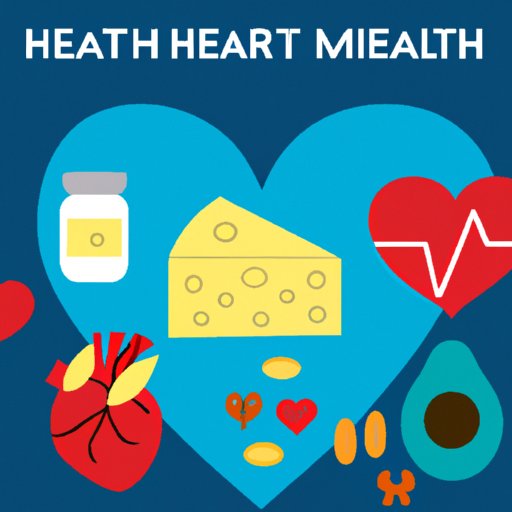Introduction
A heart healthy diet is an eating pattern that emphasizes nutrient-rich foods to support overall cardiovascular health. This type of diet focuses on consuming a variety of nutritious foods while limiting unhealthy fats and processed foods. Eating a heart healthy diet can reduce your risk of developing cardiovascular diseases like stroke, high blood pressure, and coronary artery disease.
Incorporating nutrient-dense foods such as fruits, vegetables, whole grains, lean proteins, and healthy fats into your diet is key for maintaining a healthy heart. Eating heart healthy can also help to maintain a healthy weight, lower your cholesterol and blood pressure, and decrease your risk of developing diabetes.

A Comprehensive Guide to Heart Healthy Eating
Nutrition plays an important role in supporting a healthy heart. To get started on a heart healthy eating plan, focus on understanding the different types of nutrients and how they can benefit you. Macronutrients provide energy and include carbohydrates, proteins, and fats while micronutrients provide essential vitamins, minerals, and phytonutrients needed for optimal health.
Understanding Macronutrients and Micronutrients
Carbohydrates are the body’s main source of energy and should make up 45-65 percent of your total daily calorie intake. Complex carbohydrates, such as whole grains, beans, and starchy vegetables, are digested slowly and can help keep you feeling full for longer. Examples of complex carbohydrates include quinoa, oats, sweet potatoes, and brown rice.
Protein is important for building and repairing muscle. It should make up 10-35 percent of your daily calorie intake and should be consumed from a variety of sources including fish, poultry, eggs, legumes, nuts, and seeds.
Fats are essential for providing energy and absorbing fat-soluble vitamins. Not all fats are created equal—monounsaturated and polyunsaturated fats are considered “good” fats and should make up 20-35 percent of your daily calorie intake. Sources of healthy fats include avocados, nuts, olive oil, and fatty fish. Unhealthy trans fats should be avoided.
Micronutrients are essential vitamins and minerals that play an important role in keeping your body functioning. These nutrients are found in small amounts in a variety of foods and can help to promote a healthy immune system, support brain health, and aid in digestion. Fruits and vegetables are great sources of micronutrients.
The Role of Fruits, Vegetables, and Whole Grains
Fruits and vegetables are packed with essential vitamins, minerals, and antioxidants that can help reduce inflammation and protect against chronic diseases. Aim to fill half of your plate with colorful fruits and vegetables at each meal.
Whole grains are an important part of a heart healthy diet. They are rich in fiber, which helps to reduce cholesterol levels and regulate blood sugar. Examples of whole grains include quinoa, oats, barley, and brown rice.
Protein Sources
Healthy proteins can help to maintain muscle mass and provide essential amino acids. Lean proteins such as fish, chicken, turkey, tofu, and eggs are good choices for a heart healthy diet. Legumes such as black beans, lentils, and chickpeas are also excellent sources of protein and dietary fiber.
Healthy Fats
Healthy fats are an important part of a heart healthy diet. Monounsaturated fats, such as those found in olive oil, nuts, and avocados, can help to reduce cholesterol levels and improve heart health. Polyunsaturated fats, such as omega-3 fatty acids, are also beneficial and are found in fatty fish such as salmon, tuna, and sardines. Trans fats should be avoided, as they can increase your risk of heart disease.
Exploring the Benefits of a Heart Healthy Diet
Eating a heart healthy diet has many benefits. Studies have shown that following a heart healthy diet can reduce your risk of developing cardiovascular diseases, improve cholesterol levels, and help maintain a healthy weight.
Lower Risk of Cardiovascular Disease
Cardiovascular diseases are one of the leading causes of death in the United States. Eating a heart healthy diet can reduce your risk of developing these conditions by reducing inflammation, improving blood flow, and increasing levels of “good” cholesterol. According to a study published in the journal Circulation, eating a Mediterranean-style diet high in fruits, vegetables, whole grains, and healthy fats was associated with a reduced risk of cardiovascular disease.
Improved Cholesterol Levels
High cholesterol levels can increase your risk of developing cardiovascular diseases. Eating a heart healthy diet can help to reduce cholesterol levels by limiting unhealthy fats and incorporating foods that are rich in soluble fiber. Soluble fiber binds to cholesterol in the digestive tract and carries it out of the body. Foods that are high in soluble fiber include oats, citrus fruits, apples, beans, and legumes.
Weight Control
Maintaining a healthy weight can help to reduce your risk of developing cardiovascular diseases. Eating a heart healthy diet can help to promote a healthy weight by limiting processed foods and focusing on nutrient-dense foods. Additionally, studies have shown that following a Mediterranean-style diet can help to reduce body fat and improve body composition.

10 Foods for a Heart Healthy Diet
Below are 10 foods that are great additions to a heart healthy diet:
Fish
Fish is a great source of lean protein and omega-3 fatty acids, which can help to reduce inflammation and improve heart health. Aim to consume at least two servings of fatty fish per week. Good choices include salmon, tuna, mackerel, and sardines.
Nuts
Nuts are a great source of healthy fats, protein, and fiber. They can help to reduce cholesterol levels and improve heart health. Good choices include almonds, walnuts, pistachios, and cashews.
Legumes
Legumes, such as beans, lentils, and chickpeas, are an excellent source of protein and dietary fiber. They can help to reduce cholesterol levels and improve heart health.
Whole Grains
Whole grains are a great source of dietary fiber and can help to lower cholesterol levels. Good choices include quinoa, oats, barley, and brown rice.
Berries
Berries are rich in antioxidants and can help to reduce inflammation and improve heart health. Good choices include blueberries, raspberries, blackberries, and strawberries.
Leafy Greens
Leafy greens are packed with essential vitamins and minerals and can help to reduce inflammation. Good choices include spinach, kale, collard greens, and Swiss chard.
Avocado
Avocados are a great source of healthy fats and can help to reduce cholesterol levels and improve heart health.
Olive Oil
Olive oil is a great source of monounsaturated fats and can help to reduce inflammation and improve heart health.
Garlic
Garlic is a flavorful addition to many dishes and can help to reduce inflammation and improve heart health.
Dark Chocolate
Dark chocolate is a great source of antioxidants and can help to reduce inflammation and improve heart health. Aim to choose dark chocolate with at least 70 percent cocoa.
Understanding the Role of Fats in a Heart Healthy Diet
Not all fats are created equal—it is important to understand the difference between healthy and unhealthy fats. Monounsaturated fats, such as those found in olive oil, nuts, and avocados, can help to reduce cholesterol levels and improve heart health. Polyunsaturated fats, such as omega-3 fatty acids, are also beneficial and are found in fatty fish such as salmon, tuna, and sardines. Trans fats should be avoided, as they can increase your risk of heart disease.

Tips for Planning and Enjoying Heart Healthy Meals
Planning and preparing heart healthy meals doesn’t have to be complicated. Here are some tips to help you get started:
Focus on Variety
Aim to incorporate a variety of nutrient-dense foods into your diet. Try to eat something new every week and experiment with different flavors and textures.
Incorporate Colorful Fruits and Vegetables
Fruits and vegetables are packed with essential vitamins, minerals, and antioxidants. Aim to fill half of your plate with colorful fruits and vegetables at each meal.
Be Mindful of Portion Sizes
It is important to be mindful of portion sizes when planning meals. Eating too much can lead to weight gain and put stress on the heart. Aim to fill half of your plate with fruits and vegetables, one quarter with lean proteins, and one quarter with complex carbohydrates.
Make Mealtime Fun
Cooking can be a fun and creative activity. Involve your family in meal planning and preparation and make it an enjoyable experience.
Conclusion
Eating a heart healthy diet is an important step towards maintaining a healthy heart. Incorporating nutrient-dense foods such as fruits, vegetables, whole grains, lean proteins, and healthy fats can help to reduce inflammation, improve cholesterol levels, and reduce your risk of developing cardiovascular diseases. Additionally, focusing on portion sizes, being mindful of unhealthy fats, and making mealtime fun are all great ways to enjoy a heart healthy diet.
(Note: Is this article not meeting your expectations? Do you have knowledge or insights to share? Unlock new opportunities and expand your reach by joining our authors team. Click Registration to join us and share your expertise with our readers.)
